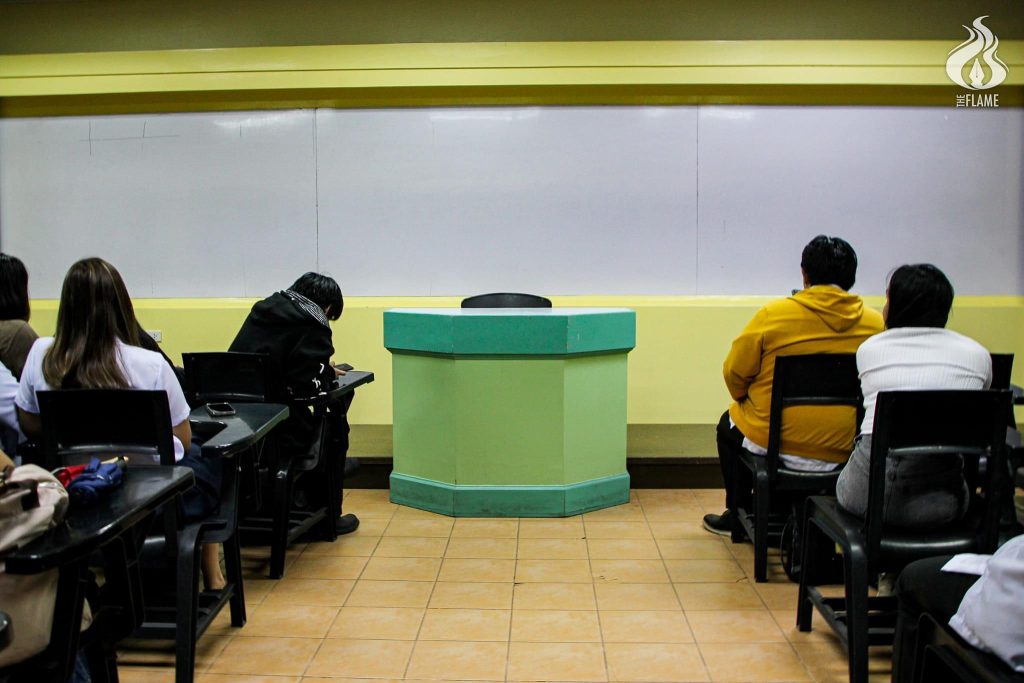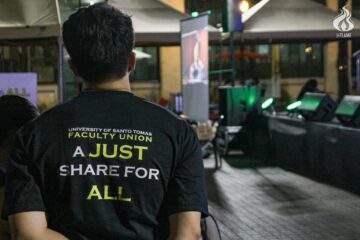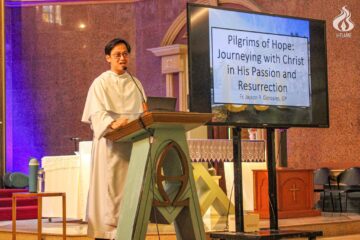SEVERAL UST lecturers have been barred from teaching in the first term of the new academic year because of their failure to comply with the Manila health permit requirement.
Some non-tenured instructors who did not secure health certificates said they did not receive their appointment letters, which serve as contracts needed for official teaching assignments.
Vacant teaching loads were reassigned to faculty members with health certificates. However, the move has not completely addressed the personnel gap in some courses.
As a result, some class schedules are in disarray as a number of subjects are left without professors to teach them.
According to UST Faculty of Arts and Letters Dean Prof. Melanie Turingan, the directive to comply with the Manila ordinance was made by the UST Office of the Vice Rector for Academic Affairs (OVRAA) and the Office of the Vice Rector for Finance (OVRF).
“The mandate to implement the compliance is from the higher office. We just cascaded it to our chairs. I think a circular was spread regarding the non-compliance and its effect,” Turingan told The Flame.
In late April, the OVRF issued a memorandum requiring all academic and non-academic staff to secure a sanitary permit in compliance with Ordinance 8793 or the Sanitation and Disinfection Code of the City of Manila. Since then, the policy has evoked strong opposition from workers because of its costly medical procedures, “below-average” public health facilities, “unjust” implementation and questionable provisions.
To obtain a health permit, employees must submit a valid ID, stool and urine samples, a filled-out drug test form and biometrics. All UST personnel who did not follow the ordinance after the July 31 deadline were threatened with loss of access to the University’s official e-service or the MyUSTe portal. The permit was also included in the list of documents that non-tenured faculty members must submit to obtain a teaching appointment.
Tenured faculty members, meanwhile, will still be given teaching loads even if they did not comply with the requirement since they are regular employees. Under the law, they cannot be dismissed unless there is a just cause to do so.
Despite heavy criticism from employees who argued that the policy is costly and discriminatory, the University reaffirmed its commitment to “meet the requirements of the laws and policies of regulatory agencies” last Aug. 7, two days before the start of regular classes.
In an apparent response to mounting criticism against the ordinance, the Manila Health Department issued a memorandum last Aug. 5 stating that all employees of academic institutions in the city must obtain sanitary permits and health certificates in accordance with Presidential Decree 856 or the Code of Sanitation in the Philippines. The decree states that “no person shall be employed in any school without first securing a health certificate from the city or municipal health officer of the locality where the establishment is located.”
With the city health office’s announcement coinciding with the beginning of classes for Thomasians, some students still lack professors to teach them since a number of part-time instructors failed or refused to follow the controversial ordinance.
Late notification?
A part-time instructor, who requested anonymity, said there was a warning about a possible termination for non-compliant non-tenured personnel but it was issued during vacation, giving faculty members “insufficient time” to prepare contingency plans.
“The email we received from [our college was] dated June 27, 2024, when in fact, [the ordinance] was forwarded to the University [on] April 25… If [the email] was released in April during ongoing classes, we could have complained. But they did not. They announced it during the summer,” the instructor said.
“All those who have assurance [that they would be reappointed], waiting to teach like myself… Everything was ready until boom, ‘give us your health certificate…’ [T]his is very unfair for all other lecturers out there, again, whose bread and butter is this teaching load that they have.”
The instructor said the late notification jeopardized the job security of affected professors and could harm the University’s “prestige and quality education” because of the loss of experienced practitioners.
“If they are going to give it (teaching load) to another professor and that subject is very difficult to teach, you have to be a practitioner for you to be able to teach that course… That’s the impact on students and the quality of education we are giving,” the faculty member said.
UST Journalism instructor Leo Laparan II, who received the same announcement, said his teaching load was initially accessible through the University’s course management system but was abruptly withdrawn before classes started.
“[I]t’s just a yes or no; two choices–black or white? White, you’re compliant, then you have a load. Black, if you’re not compliant, then you don’t have a load. What happened is they took it back,” Laparan said.
He said his decision not to comply was a deliberate one because the ordinance’s purpose should be challenged and questioned.
“The ordinance may be valid but it has questionable provisions that have been pinpointed. So there are loopholes and the fact that it’s questionable, [then] it needs to be challenged,” Laparan said.
According to the journalism instructor, critical thinking should not only be taught but also be put into practice by educators.
“It’s ironic because we teach [students] critical thinking and then we just comply and comply even if it’s questionable, right? Why not ask the hard questions first? Challenge the ordinance, right? We are like that. It’s questionable so we’re not complying with that. That’s our form of challenging it,” he said.
For UST Journalism instructor Manuel Mogato, the issue of linking the health permit to teaching capabilities is “impractical” and must be resolved to prevent disrupting class schedules.
“I hope the UST (administration) should reconsider asking part-time instructors to comply… When I learned that the teaching load was connected to the health certificate, I [was] alarmed and concerned because [it] could have an impact on the start of [the] new term. How can classes go on if there would be no teachers?” he said.
As of Aug. 11, several Thomasian students told The Flame that some of the courses they are taking still have no assigned instructors.
Excessive burden
Some students are concerned about the consequences of denying faculty members teaching load over the health permit, citing possible delays in learning progressions and the “excessive burden” of remaining teaching staff.
UST Artlets Student Council academic affairs director Mary Alexisse Calibo said removing non-compliant academic staff could affect the University’s overall performance.
“Requiring a costly health permit and terminating those who cannot comply limits the University’s workforce. This can cause academic disruption and divert resources from other essential academic services,” she said.
“The Manila health permit is unjust and has detrimental effects on academic operations and the student body in general,” she added.
The political science sophomore said UST should implement health policies that would ensure an efficient learning environment for its stakeholders.
“Addressing these concerns with more equitable and accessible health policies would be vital in ensuring that the educational environment remains conducive and compassionate to the learning and well-being of the Thomasian-Artlets community,” she said.
A Medical Biology senior, who requested anonymity, is worried that the decision to let go of non-compliant instructors would be counterproductive as the remaining faculty members are forced to shoulder heavier teaching loads.
“Only one lecturer holds two major subjects, one lecture and one laboratory, and one elective that has an equivalent amount of heavy content as a major subject,” the fourth-year student said.
“For this [semester], we have professors but there’s still that looming worry that maybe halfway they won’t be able to teach us with how many subject slots they (professors) have to fill in,” the senior added.
The Medical Biology student recalled a similar incident in the previous academic year when a particular course had not been allocated to any professor.
“I am kind of worried because it reminds me of what happened last [semester], we [didn’t] have a teacher in one of our subjects even though there is one on the Canvas. It’s a bit of a waste of tuition and time because we don’t really do anything aside from waiting for updates,” the student said.
According to a UST irregular student, who also requested anonymity, the University should uphold its core values by providing accessible health services to its employees.
“I hope UST just became open for free health permit costs knowing we have one of the best medical fields and hospitals in the country. Knowing that we encompass 3Cs… the University should be committed to our employees because they were committed to the University at first, [compassionate] enough to give benefits that they can provide, and competent enough to advise the employees to comply with this important matter since it tackles health,” the student said.
“Many will really be against that (health permit) because it’s like renewing a license. It is really tiring and costly,” the student added.
‘Unfavorable impact’
Last week, Organisasyon ng Nagkakaisang Empleyado-UST (ONE-UST), a labor coalition composed of three employee groups, said it was eyeing to take the health permit issue to court if the UST administration and the office of Manila Mayor Honey Lacuna remain unresponsive to their calls for a dialogue and the revocation of the policy.
“The ordinance thrusts UST, one of the country’s most populated universities, in a possible crisis crippling its academic operations. Over 1,000 UST faculty members may not be allowed to teach this semester for failing or refusing to secure a health certificate, which many of them consider illegal or unjust,” ONE-UST said in a recent statement.
“The ordinance will affect thousands of other workers in Manila, not only those in universities, once fully implemented under Manila Mayor Honey Lacuna.”
While the instructors found the possible legal action laudable, they believe ONE-UST should have stood its ground against the controversy earlier.
“From the start, there were questionable provisions that had loopholes. Why was it not challenged? Therefore, the move was to extend the deadlines and give time to examine the requirement, but it had an unfavorable impact on the opening of the classes,” Laparan said.
Another part-time instructor viewed the labor coalition’s response as “insincere,” arguing that despite promises of protection and support, the non-tenured faculty members did not have any choice but to comply and were not offered concrete solutions.
“That’s lip service. If that was their intention, they should not have complied. They will protect the professors, they will accept them… What we received is ‘you really have to comply because we have no choice but to not give you the load,’” the UST instructor said.
“[T]hey are insulting the intelligence of the professors … by saying that we are doing something and we are planning to take this to the court. Then why didn’t they do it back in April?”
‘Garbage in, garbage out’
According to another non-tenured lecturer, the removal of a number of Thomasian teachers will have long-term effects on the students’ learning experience and the University’s reputation.
“That has a big implication for reviews… Of course, when you lose good professors, the output is also poor. Garbage in, garbage out. The students can only excel when their professors are also good at teaching… So, what else is left of the University?” the teaching personnel said.
“It took them years to earn these professors but, in just a blink, you let them go… It’s really stupid. And cheap, its very cheap, you know, it’s disappointing because Dominicans, even the University, is well known for intelligent people and yet this particular hurdle they cannot solve,” the professor added.
Calling the policy “impractical,” Mogato expressed hope that the health permit requirement would no longer cause impediments to academic flow.
“We are in the middle of [the year] 2024 and by 2025 you will get again a health certificate which I believe is impractical… I hope the issue would be resolved soon without disrupting the school calendar,” he said.
The Flame has reached out to the Office of the Vice Rector for Academic Affairs for a statement on the issue but has not received a response as of writing. F — Christian Querol, Trisha Tamio, Rachelle Anne Mirasol and Ma. Alyanna Selda with reports from Justine Nicole Malonzo





[…] READ: UST faculty members lose teaching load over non-compliance with health permit policy […]